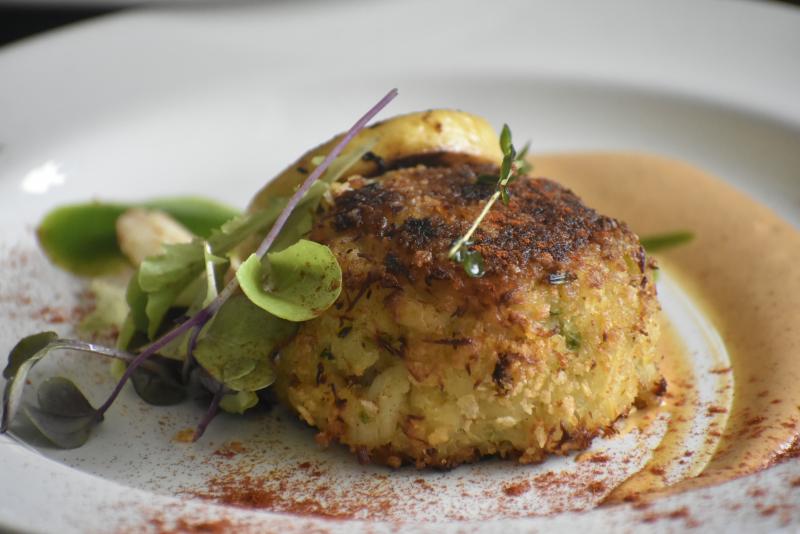
Marin commercial crabbers won’t be able to set their traps in time for Thanksgiving this year. It’s the second consecutive year that the California Department of Fish and Wildlife has delayed the opener past the holiday to prevent whale entanglements, reflecting tightened regulations that some fishermen say could have dire consequences for the West Coast fishing industry. The state’s recreational crab season, regulated separately, opened on schedule on Nov. 7.
The rules for the fishery are changing rapidly, following a lawsuit brought by the Center for Biological Diversity three years ago. A 2019 settlement instigated a number of management changes, and new restrictions were formalized on Nov. 1 with a risk assessment and implementation program. Under the rules, several new thresholds will compel Fish and Wildlife to step in and close the season should any whales or sea turtles be harmed by crab gear.
Ben Platt, president of the California Coast Crab Association, said that given the stringency of the rules, fishermen agreed that delaying the opening was the best option. Mr. Platt serves on a working group that advises the agency.
Following the group’s recommendation, Fish and Wildlife director Charlton Bonham last week pushed the planned Nov. 15 start date forward to Dec. 1. The working group, which was formed as a result of the settlement, was informed by data on concentrations of whale and sea turtle populations off the California coast at the start of November.
Among several reports was one by Point Blue Conservation Science biologists stationed on the Farallon Islands, who saw at least 50 humpback whales within one week. Naturalists from Monterey Bay National Marine Sanctuary observed 25 humpbacks and observers counted 57 at the Channel Islands National Marine Sanctuary. Blue whales were sighted in several areas of the surveyed regions, though in much lower concentrations than humpbacks. No sea turtles were spotted.
Instances of whale entanglements in crab gear have been few in recent years, though sometimes the gear is unidentifiable. The National Marine Fisheries Service reported one instance in California of a humpback whale becoming entangled in Dungeness crab gear in 2020, out of 16 total entanglements across all fisheries on the West Coast this year. In 2019, three entanglements involved California commercial Dungeness crab gear, out of 26 total entanglements on the West Coast.
Under the new rules, should three humpback whales become entangled and injured in Dungeness crab fishing gear, Fish and Wildlife would close the commercial fishing season statewide. There are additional thresholds for any harm caused to endangered blue whales and Pacific leatherback sea turtles, the other two species under heightened scrutiny due to the lawsuit.
According to Mr. Platt, delays and closures in the crab fishery are going to be systemic, and the consequences dire. “It’s going to be really hard to see this fishery continuing in any kind of viable way with the way the regulations are written,” he said. “For most of us that fish in multiple fisheries, crab is the bread-and-butter fishery. If these regulations lead to the crippling of this fishery, and it’s really hard to make a living, chances are that the whole West Coast commercial fishing industry will not make it.”
Mr. Platt pointed to a number of improvements made in the fishery over the past year, including a new gear identification and recovery program that penalizes crabbers who lose their gear.
Meanwhile, environmental groups argue the new rules do not go far enough.
“It’s good to see California finally taking whale entanglements seriously,” said Kristen Monsell, the legal director of the Center for Biological Diversity. “This new system should reduce the risk crab gear poses to whales and sea turtles. But we’re disappointed that officials didn’t do more to encourage a conversion to ropeless gear, which is the only way to truly eliminate the threat of entanglement for these ocean animals.”
For Mickey Murch, who runs Gospel Flat Farm in Bolinas and carries a legacy of commercial crabbing that his father started in the ‘80s, the delay in this year’s opener is difficult. He said the weather is typically calmer at the start of the season, which is important for smaller boats; large boats that come down from Oregon or Alaska have no trouble in any type of conditions.
Mr. Murch said there are also still plenty of crabs before Thanksgiving. The winter holidays bring a wave of demand, but after several weeks of commercial boats being in the water, the supply is diminished.
Mr. Murch is looking forward to getting out on the water when possible. He highlighted the importance of crab as a sustainable food source, and said he thought there could be further industry changes—such as spreading out crabbers so that traps are further apart from one another—that could reduce any possible impacts to whales.
Last year, the commercial fishery did not open until Dec. 15, and it was marred by a domoic acid health warning, which is not a problem this year, for the first time in a while.
The Link LonkNovember 12, 2020 at 07:17AM
https://ift.tt/3klV0Tx
Protections for whales delay crab opener - Point Reyes Light
https://ift.tt/2MkGRbk
Crab

No comments:
Post a Comment